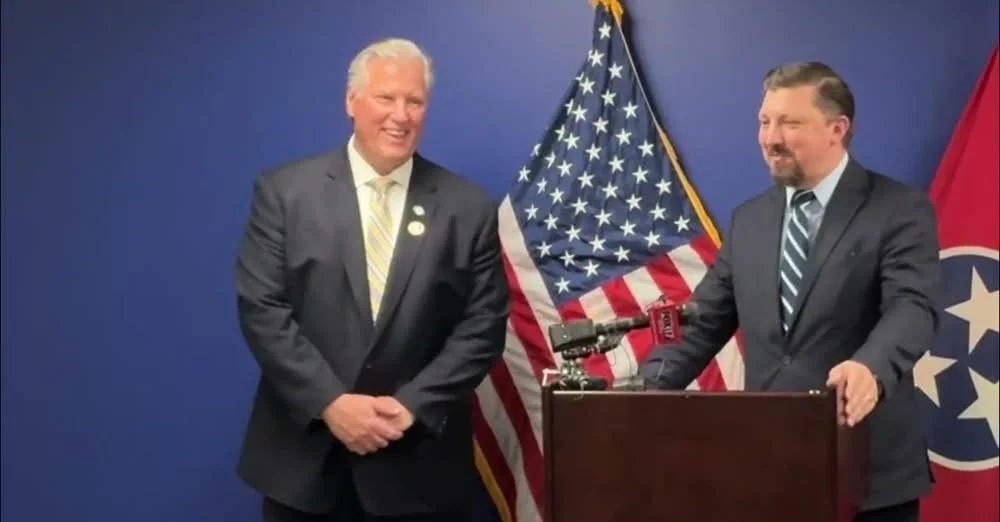TSSAA creates student advisory committee as lawmakers question the association’s future
TSSAA Legislative Council meeting earlier this month (Photo by the TSSAA)
The Tennessee Secondary School Athletic Association (TSSAA) announced the formation of its first ever student advisory committee, but lawmakers continue to question the organization’s future.
On Wednesday, the TSSAA announced the new committee will be comprised of 20 student athletes from across the state, including six members from each of the three grand divisions and two unified representatives. The group will hold its first meeting next month and will represent student interests in the organization’s decision-making.
“We are excited to have a group that will have a recognized voice for the nearly 150,000 student-athletes that participate in TSSAA sanctioned sports,” said TSSAA Executive Director Mark Reeves in a statement sent to the Tennessee Firefly. “Ultimately, the organization’s purpose is to serve student-athletes by providing opportunities that will enable them to become the best version of themselves.”
The move comes as the organization remains under scrutiny from state lawmakers. This week, State Representative Scott Cepicky, R-Culleoka, and State Senator Adam Lowe, R-Calhoun, said they plan to explore whether the TSSAA should continue to exist in its current form.
Representative Scott Cepicky (left) and Senator Adam Lowe (right) (Photo by Adam Lowe)
“There’s been a question of, has TSSAA become an institution of too much power and no oversight from the General Assembly?” said Cepicky on Monday. “So, I think what you’re going to see over the summer is you’re going to see a concerted effort from the General Assembly to look into whether or not this whole TSSAA thing needs to be dissolved, and its governance brought under the jurisdiction and the eyes of the General Assembly.”
Three years ago, the legislature passed the Access and Opportunity Act, which mandated a student’s transfer status could not be held against them if they wanted to participate in publicly funded offerings in public schools. But Senator Lowe says a disparity emerged with athletics. Transfer students were able to immediately participate and activities such as the arts, band, and honors programs. However, the TSSAA continued to require transfer student-athletes to sit out for a year. Lowe says lawmakers asked the organization to make corrective changes to align with other extracurricular activities on its own, but it never did so.
That’s why he and Cepicky filed a bill this year to legalize a one-time transfer rule for high school athletes, which would allow them to move to another school without losing that year of eligibility. The bill passed the Senate, but Cepicky made the decision this week to move discussion of his bill to the first legislative session of 2026 following a TSSAA vote in March to allow one-time transfers. Cepicky told fellow lawmakers he believes his bill is the only reason the TSSAA approved the one-time transfer rule. Lowe said despite the organization’s change, the legislative process revealed deeper problems.
“We asked TSSAA for the opportunity to collaborate towards an end that allowed student athletes to move. That was met with broadscale resistance,” said Lowe. “We heard clear testimony that the TSSAA has used threats regarding court cases to dissuade parents from pursuing damages or even consideration in our courts.”
Lowe says the organization has used a 1968 Tennessee Supreme Court decision, TSSAA vs Cox, which upheld its transfer rule, to deny parents, students, and coaches any recourse. He says the legislature will continue to be open to working together with TSSAA, but in the meantime lawmakers will explore possibilities for reform on their own.
“We’re having very active conversations to consider whether or not there needs to be legislative oversight of this entity, or of the activity of our public school students’ athletic participation. That may or could consist of everything from a commissioner of athletics to a governing board of commissioners for athletics,” said Lowe.
Lowe and Cepicky say at the very least, they want to see a representative role within the organization or some level of oversight to bring accountability through the legislature or the courts. They also said bringing back this year’s legislation with even more provisions is a distinct possibility.
“It’s (Cepicky’s bill) alive and well, and it requires just simply a vote at the House floor, it’s cleared all other hurdles,” said Lowe. “But you may see a companion bill that takes it to the next level to represent our families.”



